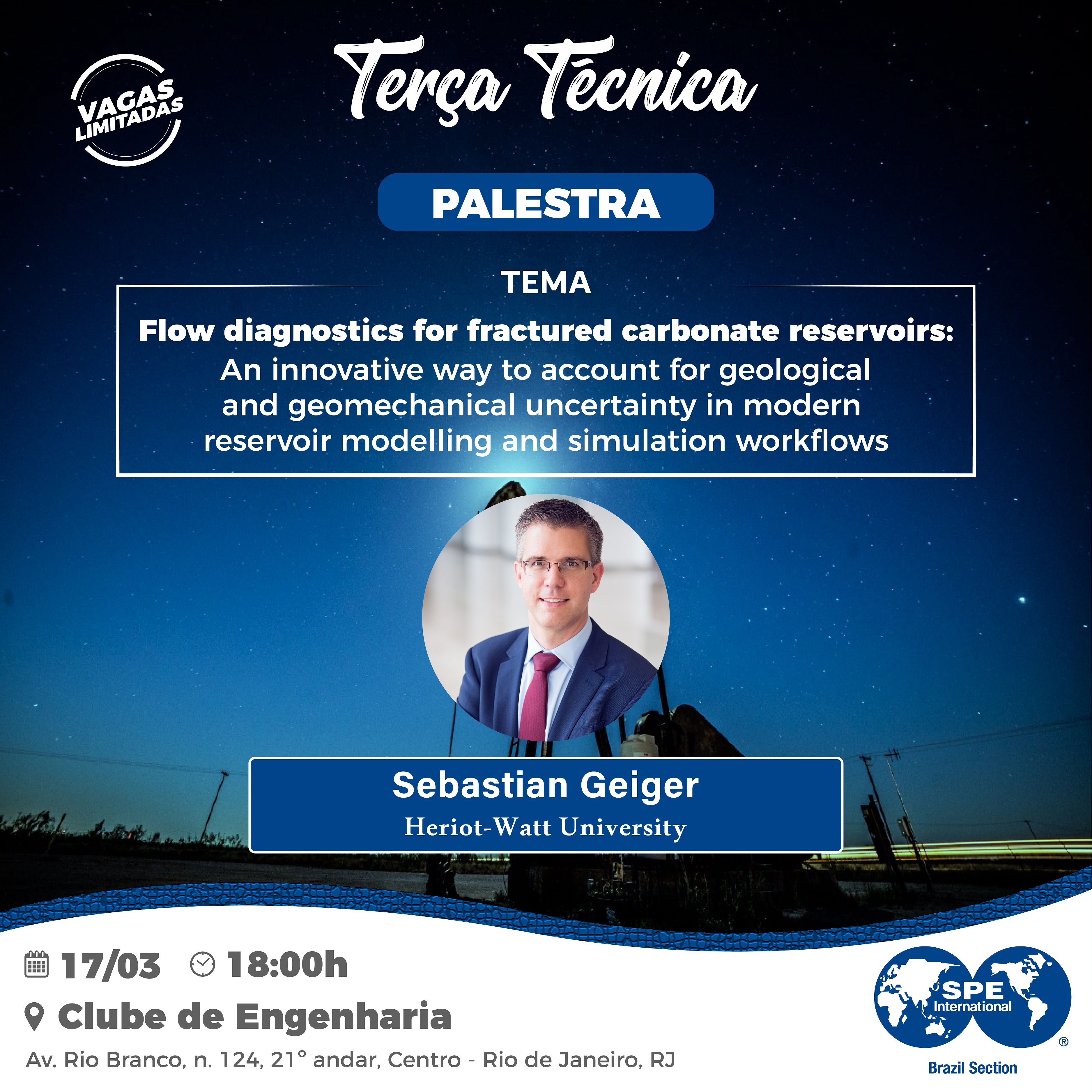Terça Técnica: “Flow diagnostics for fractured carbonate reservoirs”

Apresentação
Prezados membros da SPE e colegas da indústria de E&P,
A SPE Seção Brasil, realizará em 17/03, às 18:00h, no Clube de Engenharia mais uma edição da TERÇA TÉCNICA, que é um programa de palestras mensais com o objetivo de disseminar conhecimento e permitir a troca de experiências entre colegas de operadoras, academia e fornecedores de bens e serviços.
Nesta TERÇA TÉCNICA abordaremos o tema: “Flow diagnostics for fractured carbonate reservoirs: An innovative way to account for geological and geomechanical uncertainty in modern reservoir modelling and simulation workflows" com o Professor Sebastian Geiger, Director of the Institute of GeoEnergy Engineering at Heriot-Watt University.
Abstract:
Carbonate reservoirs, such as the giant pre-salt reservoirs offshore Brazil, are often fractured to a certain degree and contain a major part of the world’s remaining hydrocarbon reservoirs. However, these reservoirs are very difficult to characterise, develop, and manage due to their complex and uncertain geology, and so recovery factors tend to be low. Fractures can also open or close as the stress state in the reservoir changes during production, adding further complexities to the reservoir management process. Modern reservoir simulation and uncertainty quantification workflows allow us to support the design of field development and management plans that account for geological uncertainties. However, simulating fractured carbonate reservoirs is not trivial and the time spent running full-physics reservoir simulations is valuable; it should be used for studying models that explore a realistic range of (geological) uncertainties and hence provide the most insight.
We have developed new flow diagnostics tools for naturally fractured carbonate reservoirs which sacrifice some physical detail in exchange for speed but still allow us to compute some of the essential dynamic behaviours in the reservoir, e.g. how effectively wells communicate with each other or which wells are at risk of early breakthrough. A particular innovative addition to our flow diagnostics is that we can also account for geomechanical effects in the reservoir; we can therefore quickly evaluate if and where fractures are likely to open or close, and how reservoir dynamics evolve as a consequence, due to production-induced stress changes.
Our new technology enables us to screen large numbers of geological models based on their approximate dynamic and geomechanical behaviours in a matter of minutes prior to commencing more time-consuming full-physics reservoir simulations. Using intuitive metrics we quantify the reservoir dynamics to cluster models and reduce the number of full-physics simulations required for robust reservoir forecasting without affecting the original range of geological and geomechanical uncertainties. Flow diagnostics hence offer a natural pre-processing step that complements modern coupled hydro-mechanical reservoir simulation, uncertainty quantification, and optimisation workflows, allowing us to spend valuable simulation time on the cases that yield a greatly improved understanding of reservoir performance and related uncertainties in carbonate reservoirs.
Bio:
Biography: Professor Sebastian Geiger holds the Energi Simulation Chair and is the Director of the Institute of GeoEnergy Engineering at Heriot-Watt University. Previously, he was an assistant and associate professor at Heriot-Watt University, spent time as a visiting researcher at the Australia National University, Imperial College London, and Aramco Research Centre in Houston, and was a post-doctoral researcher at ETH Zurich. His research interests include the characterization, modelling, and simulation of naturally fractured reservoirs across all scales. He has authored or co-authored more than 170 technical papers. Sebastian holds a PhD degree from ETH Zurich and an MSc degree from Oregon State University. He is a member of Interpore, SPE, EAGE, AAPG, and AGU. He is an elected Fellow of the Energy Institute and received the 2017 Alfred Wegener Award from the EAGE for his pioneering research into carbonate reservoir modelling and simulation.
Local: Clube de Engenharia (Av. Rio Branco, 124, 21º andar, Centro - Rio de Janeiro, RJ)
Horário 18:00h
Preço especial para membros SPE.
Vagas limitadas. Garanta já a sua!
DATA DO
EVENTO
LOCAL DO EVENTO
Clube de Engenharia
Av. Rio Branco, 124, 21º andar, Centro - Rio de Janeiro
Rio de Janeiro